PinkUp October
2024 marks AKD’s 6th year turning PINK for October’s Breast Cancer Awareness Month.
To date we have raised over $430,000 for the McGrath Breast Care Nurses who provide invaluable support and care to women and men experiencing breast cancer from the time of diagnosis and throughout treatment.
Turning Pink for October has become an AKD tradition throughout our business to customers and our communities.
“Check Yourself to Protect Yourself” was created to highlight the importance of awareness by starting the conversation about the importance of being body-aware for early detection.
Knowing what is normal for you and your body is important. If you know what’s normal for you, it’ll be easier to notice when something’s different.
Anybody can develop cancer. About one in two Australians will be diagnosed with cancer by the age of 85. The risk of cancer increases with age – more than six times as many cancers are diagnosed in people over 50 years, as in those under 50.
One in three cancer cases can be prevented.
Increased awareness about cancer, screening programs and early detection means that cancer diagnoses in younger people are increasing – which means it is often found at an earlier stage and can therefore be treated more effectively.
Each year, there are more than 13,000 cancer deaths. Smoking, sun exposure, poor diet, alcohol use and inadequate physical activity are significant risk factors.
With a number of simple lifestyle changes you can make to help reduce your risk of cancer.
- Not smoking, or giving up, is the single most effective strategy to prevent cancer. More than one in five cancer deaths (over 7700 every year) are caused by cigarette smoking.
- Protecting your skin from exposure to the sun’s ultraviolet (UV) radiation is a simple and very effective strategy for preventing skin cancer. Over 15,000 Australians are diagnosed with a melanoma each year.
- It is estimated that more than 4000 cancer deaths annually are due to poor diet, alcohol use, physical inactivity and being overweight
Resources: https://cancer.org.au/cancer-information/what-is-cancer
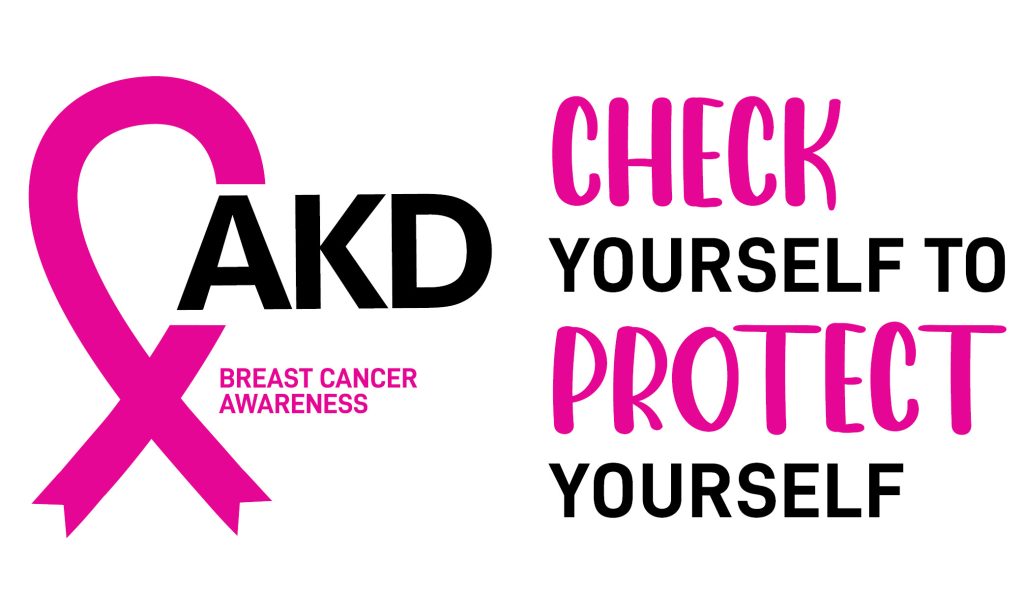
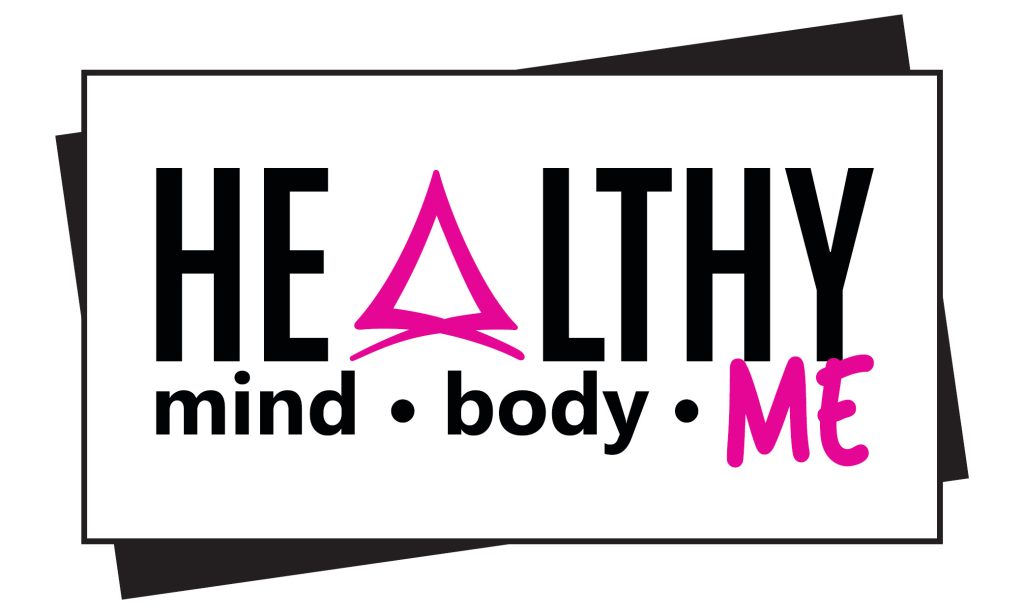
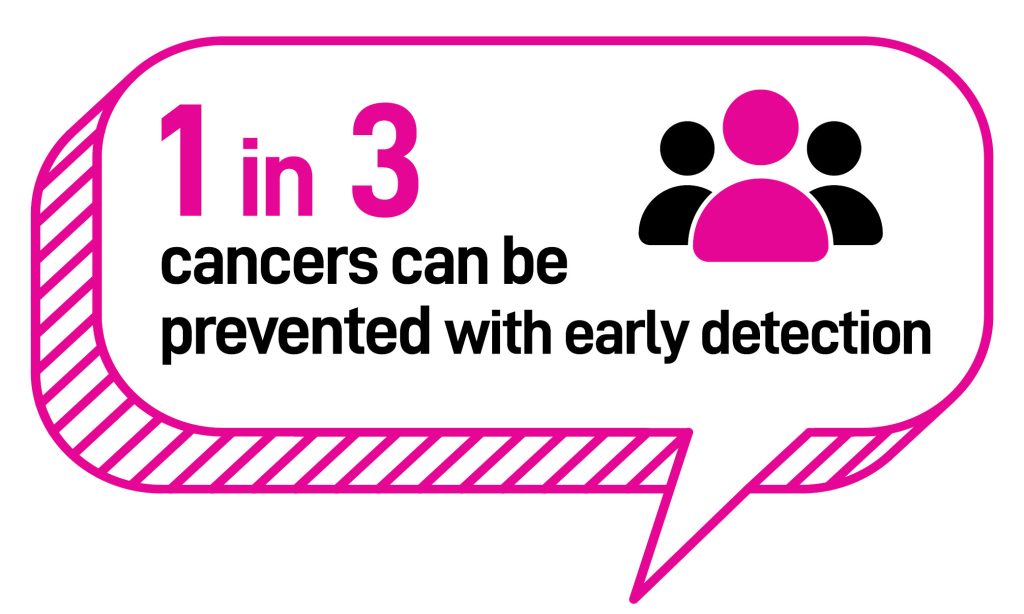
Help reduce your cancer risk.
Caring about your family means caring about your own health too.
Skin Cancer
Chances are you know someone who has been affected by skin cancer. Australia has one of the highest rates of skin cancer in the world. Each year almost 2000 Australians die from this almost entirely preventable disease.
Be SunSmart.
Being SunSmart is a simple and effective way to reduce your risk of developing skin cancer.

For best protection, the Cancer Council recommends using all five SunSmart steps:
- Slip on some sun-protective clothing that covers as much skin as possible.
- Slop on SPF 50 or SPF50+, broad-spectrum, water-resistant sunscreen. Put it on 20 minutes before you go outdoors and every two hours afterwards. Sunscreen should never be used to extend the time you spend in the sun.
- Slap on a hat – broad brim or legionnaire style to protect your face, head, neck and ears.
- Seek shade.
- Slide on some sunglasses – make sure they meet Australian Standards.
Think UV, not heat
UV from the sun cannot be seen like sunlight or felt like the sun’s warmth (heat), so it can be damaging without us even knowing. UV can still be at damaging levels on cool or cloudy days so we can’t rely on the weather or our senses to decide when to protect ourselves. Heat and UV affect our bodies differently.
- Infrared Radiation – Heat: We can feel heat on our skin and results in surface burns, sweating, headache, dehydration, warmth.
- Ultraviolet Radiation – UV: Our senses cannot detect UV and results in cell damage, skin cancer, sunburn, tanning, eye damage, wrinkling and ageing.
Keep an eye on your skin 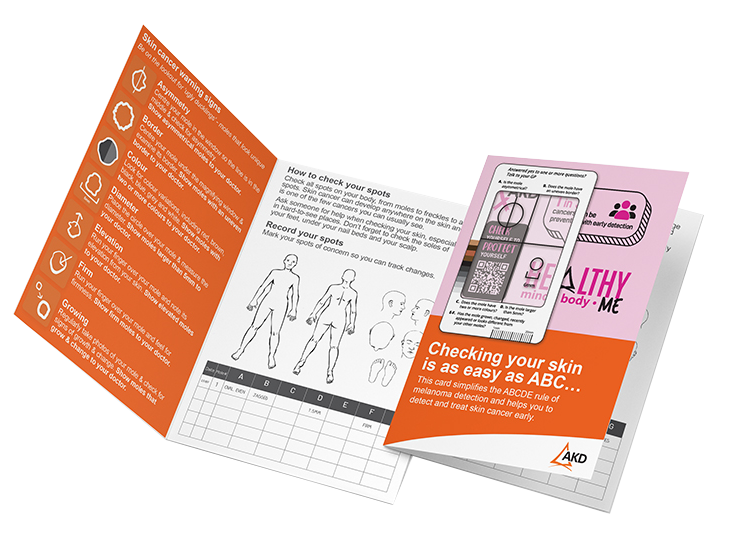
Check your skin regularly for any new spots or changes in shape, colour or size of existing spots. It’s as easy as ABC…
AKD has partnered with Sunsafe Workplace to provide Skin Check Cards to our employees, customers and wider communities. The cards simplify the ABCDE rule of melanoma detection and helps you to detect skin cancer.
*Limited stock available
If you notice anything unusual, see your doctor as soon as possible. Most skin cancer can be successfully treated if it is found early.
Resources: https://cancer.org.au/cancer-information/causes-and-prevention/sun-safety, https://cancer.org.au/cancer-information/causes-and-prevention/sun-safety/preventing-skin-cancer, https://cancer.org.au/cancer-information/causes-and-prevention/sun-safety/be-sunsmart
Diet and exercise.
Evidence shows that being overweight, having a poor diet, drinking alcohol and doing little or no exercise all increase your risk of developing certain cancers.
By getting regular exercise and eating well you can reduce your cancer risk regardless of your body weight.
Explore Cancer Council’s valuable resources:
Alcohol
The more you drink, the greater the risk.
If you choose to drink, the Cancer Council recommend you follow the National Health and Medical Research Council guidelines and limit your intake to no more than 10 standard drinks a week and no more than 4 standard drinks on any one day.
Explore Cancer Council’s valuable resources:
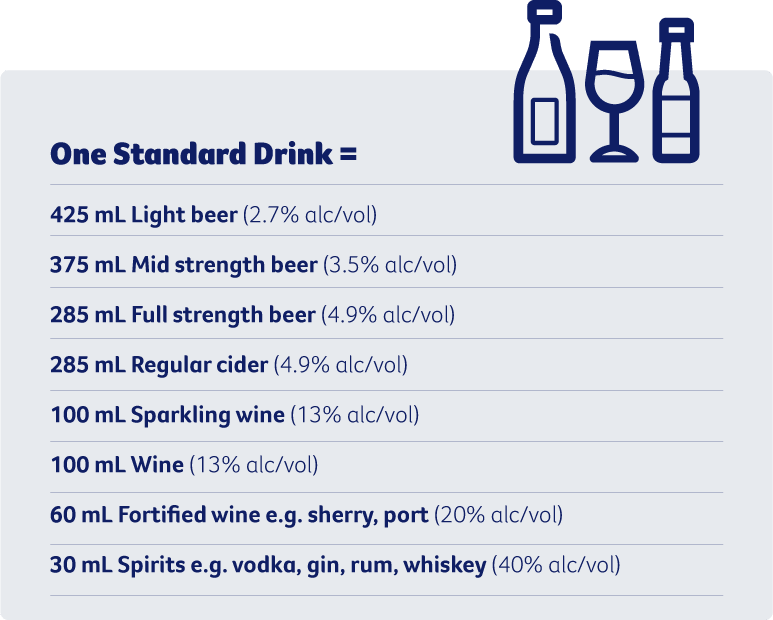
Smoking
If you smoke or vape, quitting is the best thing you can do to reduce the risk of developing cancer and to improve your health in general.
Tobacco smoking is the largest preventable cause of cancer, responsible for more cancer deaths in Australia than any other single factor. Smoking affects the smoker, as well as those around them.
E-cigarettes, also known as vapes, are harmful. E-cigarettes can contain over 200 chemicals including some that cause cancer.
Going smoke-free means within:
| 20 minutes | You already have less risk of a heart attack. |
| 24 hours | Oxygen levels in your blood increase significantly, meaning muscles, heart and other vital organs can work more easily. |
| 1 week | You will have already saved lots of money, as much as $350 for a pack a day smoker. |
| 1 month | Your immune system will have improved; it can be better at detecting and removing cancer cells. |
| 3 months | Your lungs natural cleaning system is restored and can better protect you from lung disease. |
| 5-15 years | Your risk of stroke and cancers of the lung, mouth, throat, and oesophagus (food pipe) significantly decreases. |
Explore Cancer Council’s valuable resource:
Quitting cigarettes or e-cigarettes can be challenging. However, getting some expert tips from Quitline (13 7848), your GP, or pharmacist can really make a difference
Early Detection and Screening
Cancer screening saves lives. Screening is one of the most effective ways to detect early signs of cancer.
It has never been more important to make sure your screening is up-to-date. National screening programs are available in Australia to detect breast cancer, bowel cancer and cervical cancer.
Explore Cancer Council’s valuable resources
If you GROW them, KNOW them!
Part of good breast health understanding means getting to know your breasts, so you know what’s normal for you. It’s about actively taking care of your pair!
Follow this simple process and remember to repeat each month.
LOOK – at the shape and appearance of your breasts and nipples in the mirror with your hands by your sides. Raise your arms above your head and have another look.
FEEL – all of your breasts and nipples, looking for anything that isn’t normal for you. Feel from your collarbone to below the bra-line and under your armpit too.
LEARN – what is normal for you! Breasts come in all different shapes and sizes.
If you have any questions or concerns contact your local GP or healthcare professional.
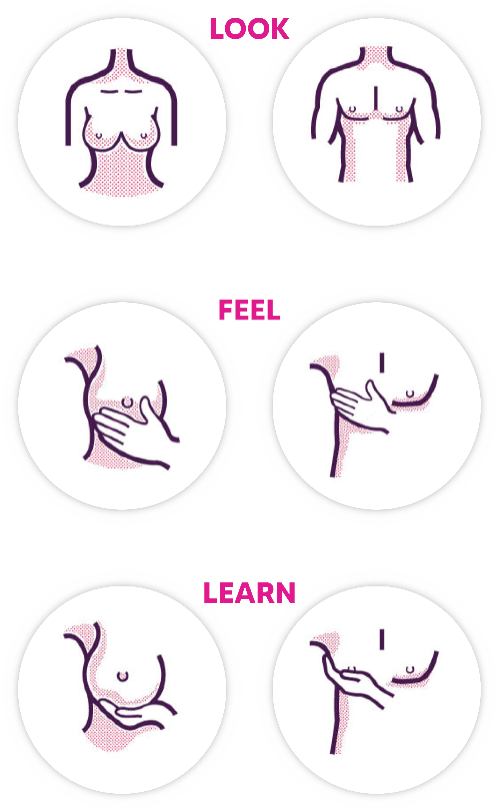
Disclaimer: The information provided on this page is sourced from the Cancer Council website. It is intended to help raise awareness about reducing cancer risk through sun safety, regular screening, a balanced diet, exercise, and the avoidance of smoking and excessive drinking. If you notice any changes in your health, it is important to see your doctor immediately. For more information, please call the Cancer Council at 13 11 20.



